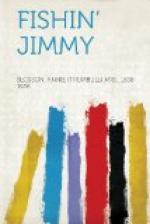“An’ then he telled us about the day when this preacher come along by the lake—a dreffle sightly place, this min’ster said; he ’d seed it hisself when he was trav’lin’ in them countries—an’ come acrost two men he knowed well; they was brothers, an’ they was a-fishin’. An’ he jest asked ’em in his pleasant-spoken, frien’ly way—there wa’n’t never sech a drawin’, takin’, lovin’ way with any one afore as this man had, the min’ster said—he jest asked ’em to come along with him; an’ they lay down their poles an’ their lines an’ everythin’, an’ jined him. An’ then he come along a spell further, an’ he sees two boys out with their ole father, an’ they was settin’ in a boat an’ fixin’ up their tackle, an’ he asked ’em if they ‘d jine him, too, an’ they jest dropped all their things, an’ left the ole man with the boat an’ the fish an’ the bait an’ follered the preacher. I don’t tell it very good. I ’ve read it an’ read it sence that; but I want to make ye see how it sounded to me, how I took it, as the min’ster telled it that summer day in Francony meetin’. Ye see I ’d no idee who the story was about, the man put it so plain, in common kind o’ talk, without any come-to-passes an’ whuffers an’ thuffers, an’ I never conceited ’t was a Bible narr’tive.
“An’ so fust thing I knowed I says to myself, ’That ‘s the kind o’ teacher I want. If I could come acrost a man like that, I ’d jest foller him, too, through thick an’ thin.’ Well, I can’t put the rest on it into talk very good; ‘t aint jest the kind o’ thing to speak on ’fore folks, even sech good friends as you. I aint the sort to go back on my word,—fishermen aint, ye know,—an’ what I ’d said to myself ‘fore I knowed who I was bindin’ myself to, I stuck to a’terwards when I knowed all about him. For ’t aint for me to tell ye, who’ve got so much more larnin’ than me, that there was a dreffle lot more to that story than the fishin’ part. That lovin’, givin’ up, suff’rin’, dyin’ part, ye know it all yerself, an’ I can’t kinder say much on it, ’cept when I ’m jest all by myself, or—’long o’ him.




